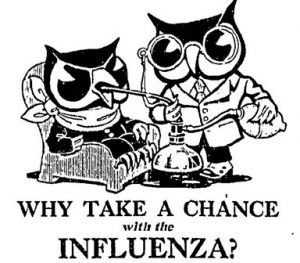 Welcome to the NEH Summer Seminar on the Spanish Influenza of 1918. I am pleased that you are considering spending some of your precious summer weeks engaged in a thoughtful, engaging, and rewarding period of study. I am a professor of history at Virginia Tech, where I have taught for about 20 years. I became interested in the Spanish Flu several years ago, and find it the source of remarkable human stories, powerful social forces, and deep medical challenges. I encourage you to keep reading, to learn more about the NEH Summer Seminar, and then to explore the other sections of this website to learn more about the readings, scholars, and schedule, as well as logistical issues related to lodging, stipends, and applications. I first hosted a seminar on the 1918 Spanish Influenza in July 2015, and I am looking forward to hosting this seminar again in 2018 — the centennial of this major event in American and world history.
Welcome to the NEH Summer Seminar on the Spanish Influenza of 1918. I am pleased that you are considering spending some of your precious summer weeks engaged in a thoughtful, engaging, and rewarding period of study. I am a professor of history at Virginia Tech, where I have taught for about 20 years. I became interested in the Spanish Flu several years ago, and find it the source of remarkable human stories, powerful social forces, and deep medical challenges. I encourage you to keep reading, to learn more about the NEH Summer Seminar, and then to explore the other sections of this website to learn more about the readings, scholars, and schedule, as well as logistical issues related to lodging, stipends, and applications. I first hosted a seminar on the 1918 Spanish Influenza in July 2015, and I am looking forward to hosting this seminar again in 2018 — the centennial of this major event in American and world history.The seminar will provide teachers with an opportunity to read and discuss the most recent scholarship on the 1918 Spanish Flu written by American and world historians as well as interdisciplinary studies by epidemiologists, demographers, and public health scholars. In addition, participants will have opportunities to pursue their own research topics, using easily accessible primary sources from online newspaper databases, archived oral histories, and documentation from public health authorities. Seminar participants will acquire a broader understanding of the role of disease and health in American and world history, an awareness of how historical precedents inform current plans for dealing with global pandemics, and an appreciation of a complicated topic that engages scholarly as well as broad general interest.
Summer scholars should expect an intellectually challenging experience, with opportunities to acquire new knowledge, pursue investigations, discuss findings with leading scholars, and explore the implications of understanding disease in history. The seminar will follow a discussion-based format, to ensure the participation of all those attending. The usual schedule during the two weeks in Blacksburg will be a morning discussion, from approximately 9 to 12 am. Following lunch, the seminar will resume for an afternoon session, usually 2-4 pm. Time will be set aside in these weeks for scholars to do readings, conduct research, and engage with each other and visiting scholars. The seminars will take place in Newman library, which provides a collegial and comfortable environment for engaging with people, books, and technology. Summer scholars will have unscheduled time on the first Saturday, prior to departing for DC, and on the second Sunday, after returning from DC.
Each summer scholar will explore aspects of the Spanish influenza using primary sources available from the library and archival collections in Washington, electronically through the Virginia Tech library, and through public data bases such as Chronicling America and the US Census. The research will be made accessible in final presentations as well as a series of posters, in both print and electronic forms. Guidance will be provided on the research process, historical interpretation, presentation development, and poster design. The schedule for the seminar will include ample time to work on research projects, including most of the time spent in Washington DC, so scholars will be encouraged to develop work appropriate to their professional needs and academic interests. The posters and presentations could be suitable for displays in schools and libraries, submissions to professional conferences, or continuing education activities in the scholars’ communities.

